- Головна
- Готові шкільні презентації
- Презентація на тему «Festivals in Britain»
Презентація на тему «Festivals in Britain»
265
Слайд #1
Festivals in Britain
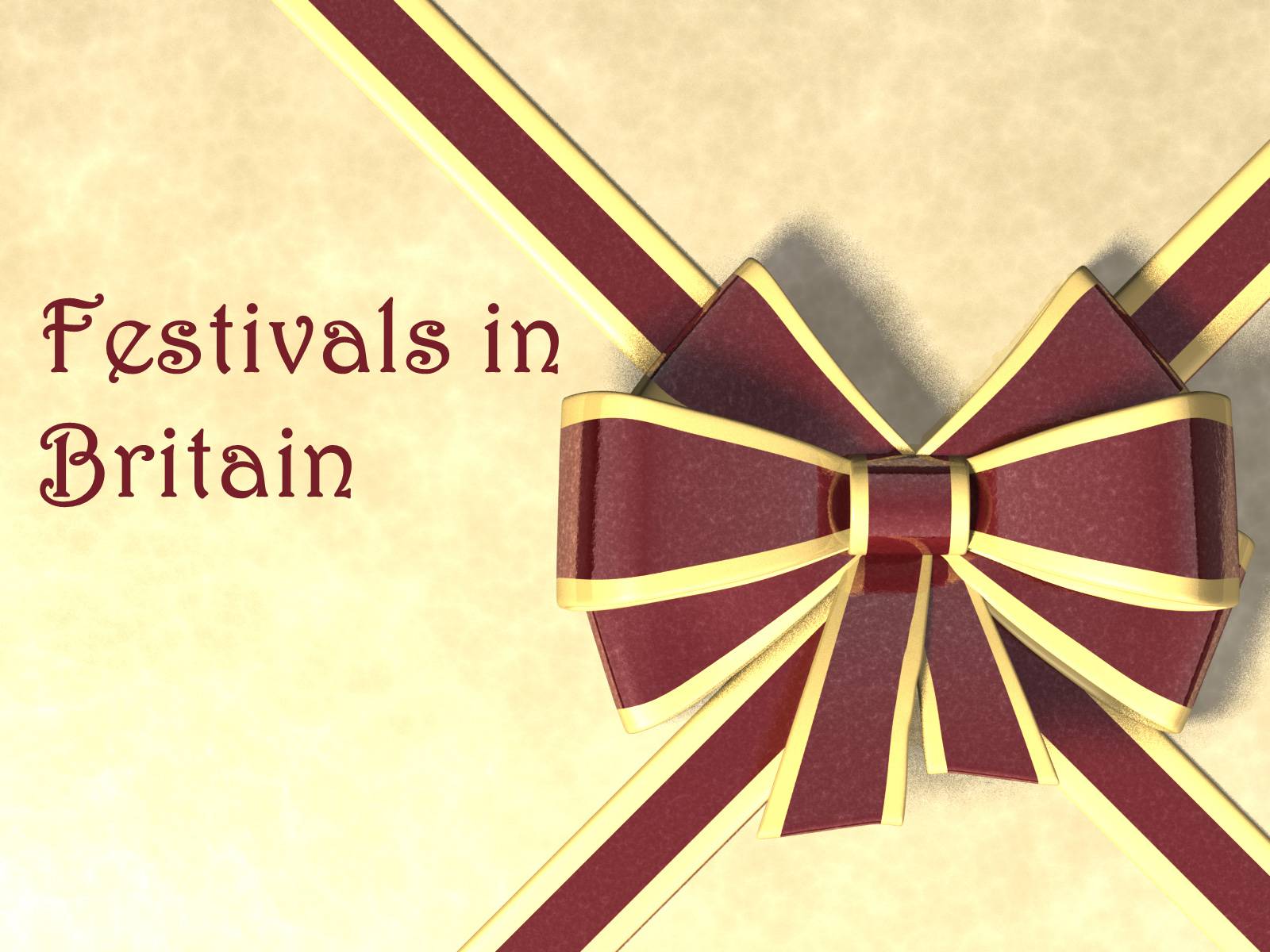
Слайд #2
Midsummer's Eve
Although Midsummer's Eve is not traditionally a widely celebrated festival in Britain, it is celebrated by druids (practitioners of an ancient religion now virtually extinct) at the prehistoric stone circle of Stonehenge. In recent years, groups of travellers – caravan dwellers – and hippies have also tried to claim the right to enter the circle to see the sun rice on Midsummer's Day, but they have generally not been allowed, largely because of fears of damage to the ancient monument.
Although Midsummer's Eve is not traditionally a widely celebrated festival in Britain, it is celebrated by druids (practitioners of an ancient religion now virtually extinct) at the prehistoric stone circle of Stonehenge. In recent years, groups of travellers – caravan dwellers – and hippies have also tried to claim the right to enter the circle to see the sun rice on Midsummer's Day, but they have generally not been allowed, largely because of fears of damage to the ancient monument.
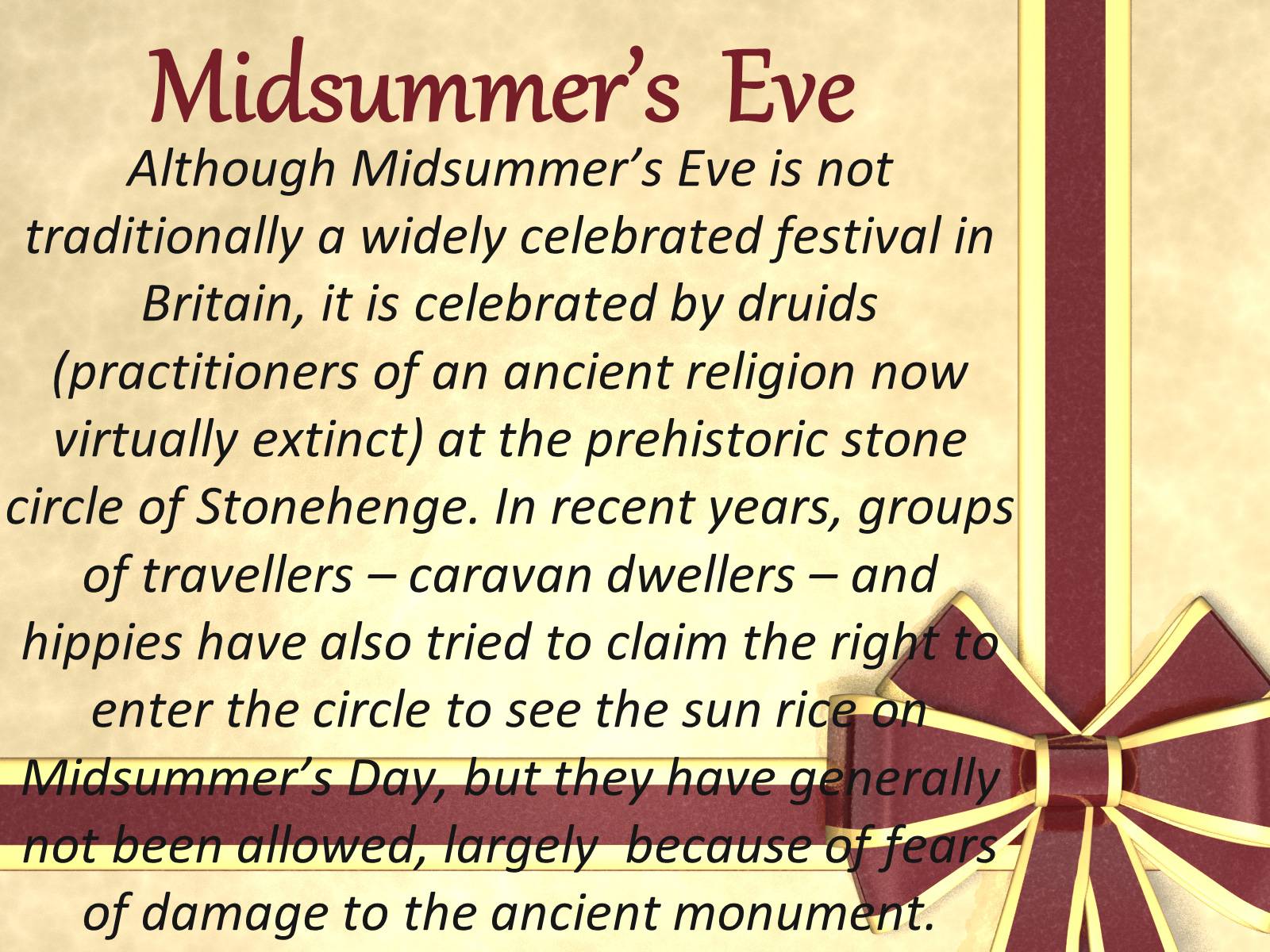
Слайд #3
Midsummer's Eve
Although Midsummer's Eve is not traditionally a widely celebrated festival in Britain, it is celebrated by druids (practitioners of an ancient religion now virtually extinct) at the prehistoric stone circle of Stonehenge. In recent years, groups of travellers – caravan dwellers – and hippies have also tried to claim the right to enter the circle to see the sun rice on Midsummer's Day, but they have generally not been allowed, largely because of fears of damage to the ancient monument.
Although Midsummer's Eve is not traditionally a widely celebrated festival in Britain, it is celebrated by druids (practitioners of an ancient religion now virtually extinct) at the prehistoric stone circle of Stonehenge. In recent years, groups of travellers – caravan dwellers – and hippies have also tried to claim the right to enter the circle to see the sun rice on Midsummer's Day, but they have generally not been allowed, largely because of fears of damage to the ancient monument.
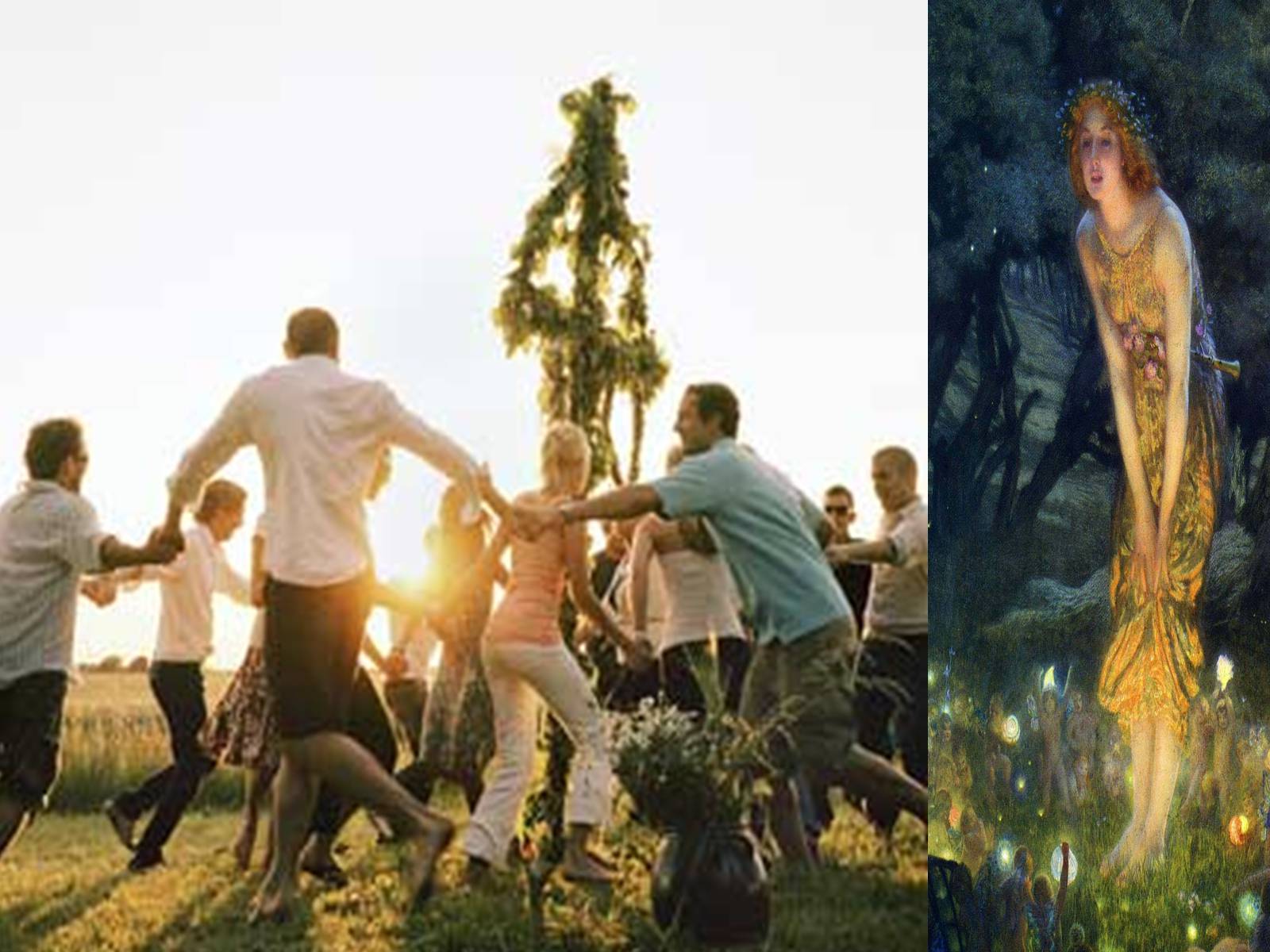
Слайд #4
Harvest festival
This is a very old festival, dating from pre-Christian times nowadays celebrated by Christians, Each October, the churches – particularly in the countryside – are decorated with flowers, fruit, vegetables and other crops, and the local people come to give thanks for the successful completion of the harvest.
This is a very old festival, dating from pre-Christian times nowadays celebrated by Christians, Each October, the churches – particularly in the countryside – are decorated with flowers, fruit, vegetables and other crops, and the local people come to give thanks for the successful completion of the harvest.
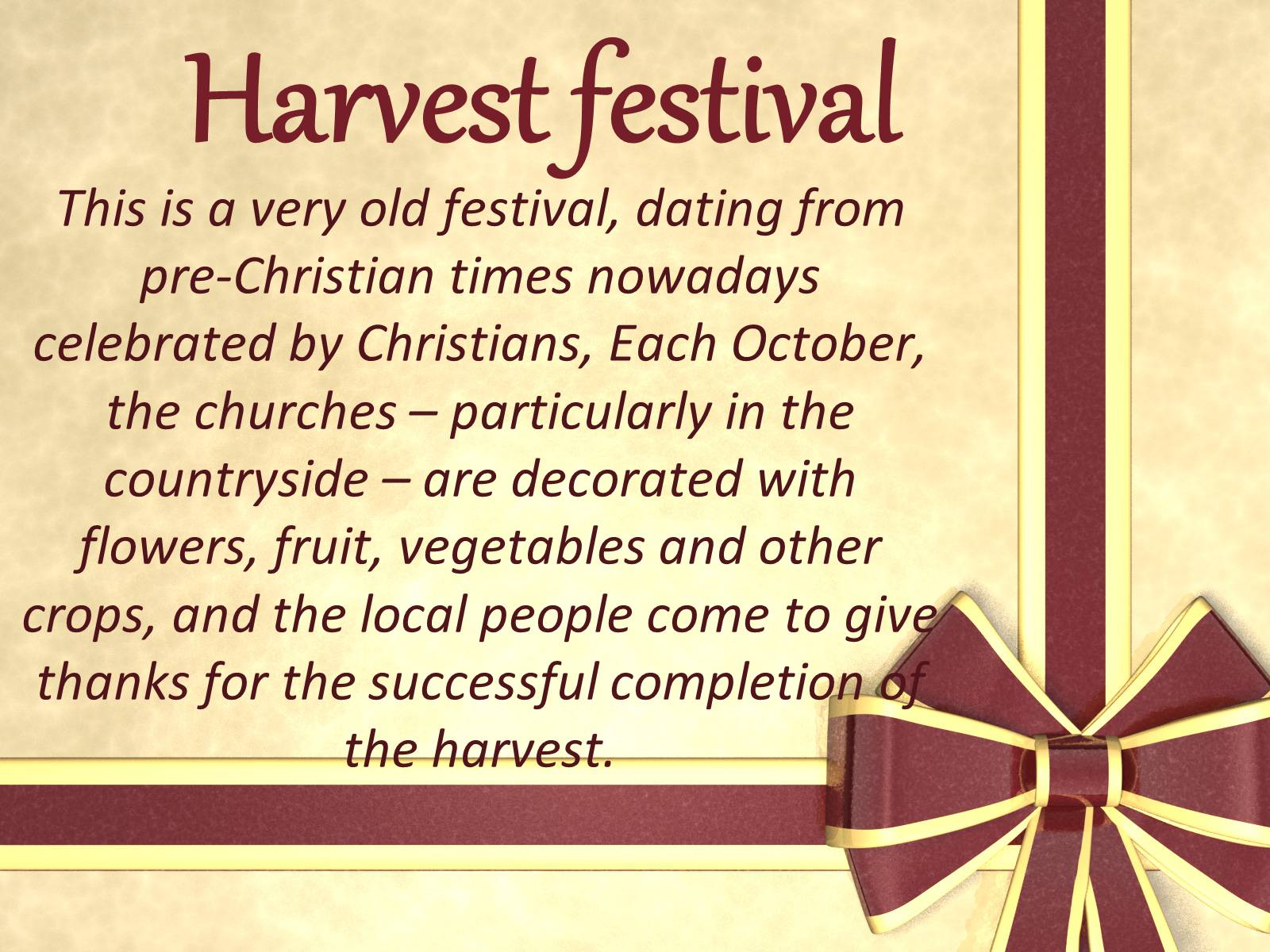
Слайд #5
Harvest festival
This is a very old festival, dating from pre-Christian times nowadays celebrated by Christians, Each October, the churches – particularly in the countryside – are decorated with flowers, fruit, vegetables and other crops, and the local people come to give thanks for the successful completion of the harvest.
This is a very old festival, dating from pre-Christian times nowadays celebrated by Christians, Each October, the churches – particularly in the countryside – are decorated with flowers, fruit, vegetables and other crops, and the local people come to give thanks for the successful completion of the harvest.
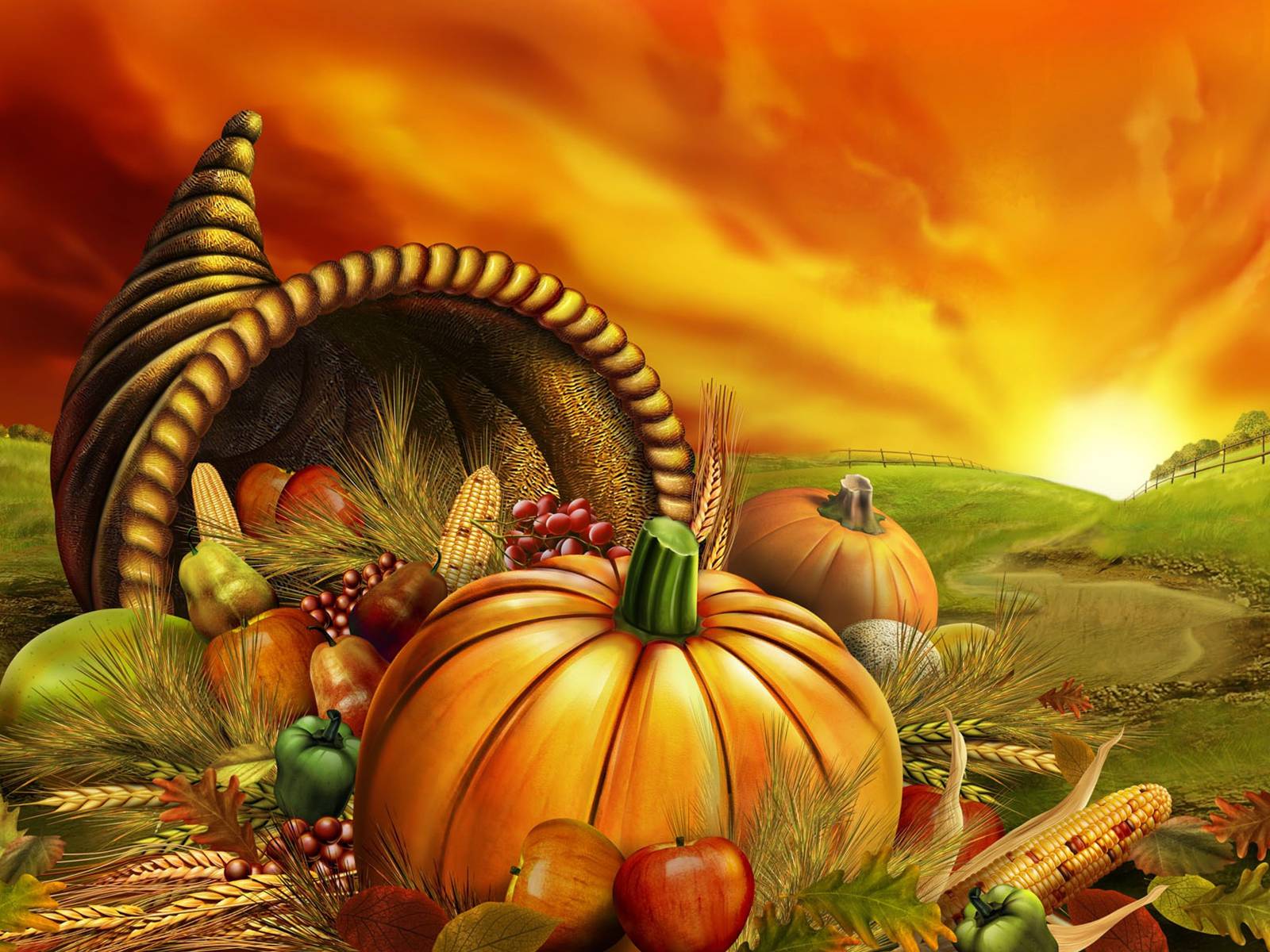
Слайд #6
Halloween
The name comes from “the eve of All Hallows”, also known in the Christian calendar as All Saints. According to folklore, on this night – 31 October – witches and ghosts and have parties. Groups of children also play “trick-or-treat” on their neighbours, going from door to door and playing a harmless but slightly unpleasant trick on anyone who refuses to give them a sweet or other gift.
The name comes from “the eve of All Hallows”, also known in the Christian calendar as All Saints. According to folklore, on this night – 31 October – witches and ghosts and have parties. Groups of children also play “trick-or-treat” on their neighbours, going from door to door and playing a harmless but slightly unpleasant trick on anyone who refuses to give them a sweet or other gift.

Слайд #7
Halloween
The name comes from “the eve of All Hallows”, also known in the Christian calendar as All Saints. According to folklore, on this night – 31 October – witches and ghosts and have parties. Groups of children also play “trick-or-treat” on their neighbours, going from door to door and playing a harmless but slightly unpleasant trick on anyone who refuses to give them a sweet or other gift.
The name comes from “the eve of All Hallows”, also known in the Christian calendar as All Saints. According to folklore, on this night – 31 October – witches and ghosts and have parties. Groups of children also play “trick-or-treat” on their neighbours, going from door to door and playing a harmless but slightly unpleasant trick on anyone who refuses to give them a sweet or other gift.

Слайд #8
Guy Fawkes' Night
In 1605 a group of Catholic conspirators, led by Guy Fawkes, attempted to blow up the Protestant Parliament of King James I. They succeeded in hiding 30 barrels of gunpowder in the building, but on 5 November the so-called “Gunpowder Plot” was discovered. Fawkes and his associates were caught and later burned at the stake.
In 1605 a group of Catholic conspirators, led by Guy Fawkes, attempted to blow up the Protestant Parliament of King James I. They succeeded in hiding 30 barrels of gunpowder in the building, but on 5 November the so-called “Gunpowder Plot” was discovered. Fawkes and his associates were caught and later burned at the stake.
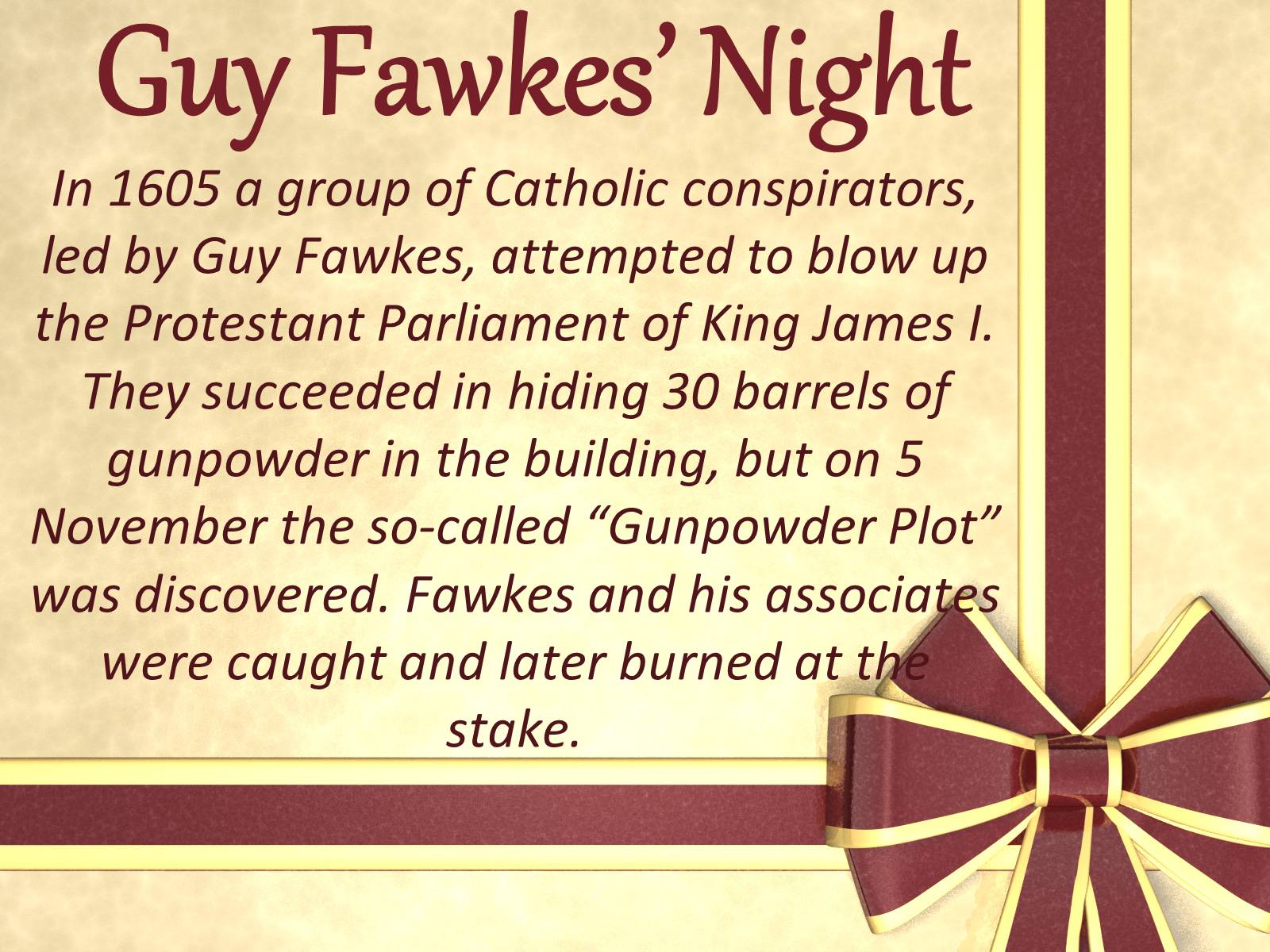
Слайд #9
Guy Fawkes' Night
In 1605 a group of Catholic conspirators, led by Guy Fawkes, attempted to blow up the Protestant Parliament of King James I. They succeeded in hiding 30 barrels of gunpowder in the building, but on 5 November the so-called “Gunpowder Plot” was discovered. Fawkes and his associates were caught and later burned at the stake.
In 1605 a group of Catholic conspirators, led by Guy Fawkes, attempted to blow up the Protestant Parliament of King James I. They succeeded in hiding 30 barrels of gunpowder in the building, but on 5 November the so-called “Gunpowder Plot” was discovered. Fawkes and his associates were caught and later burned at the stake.
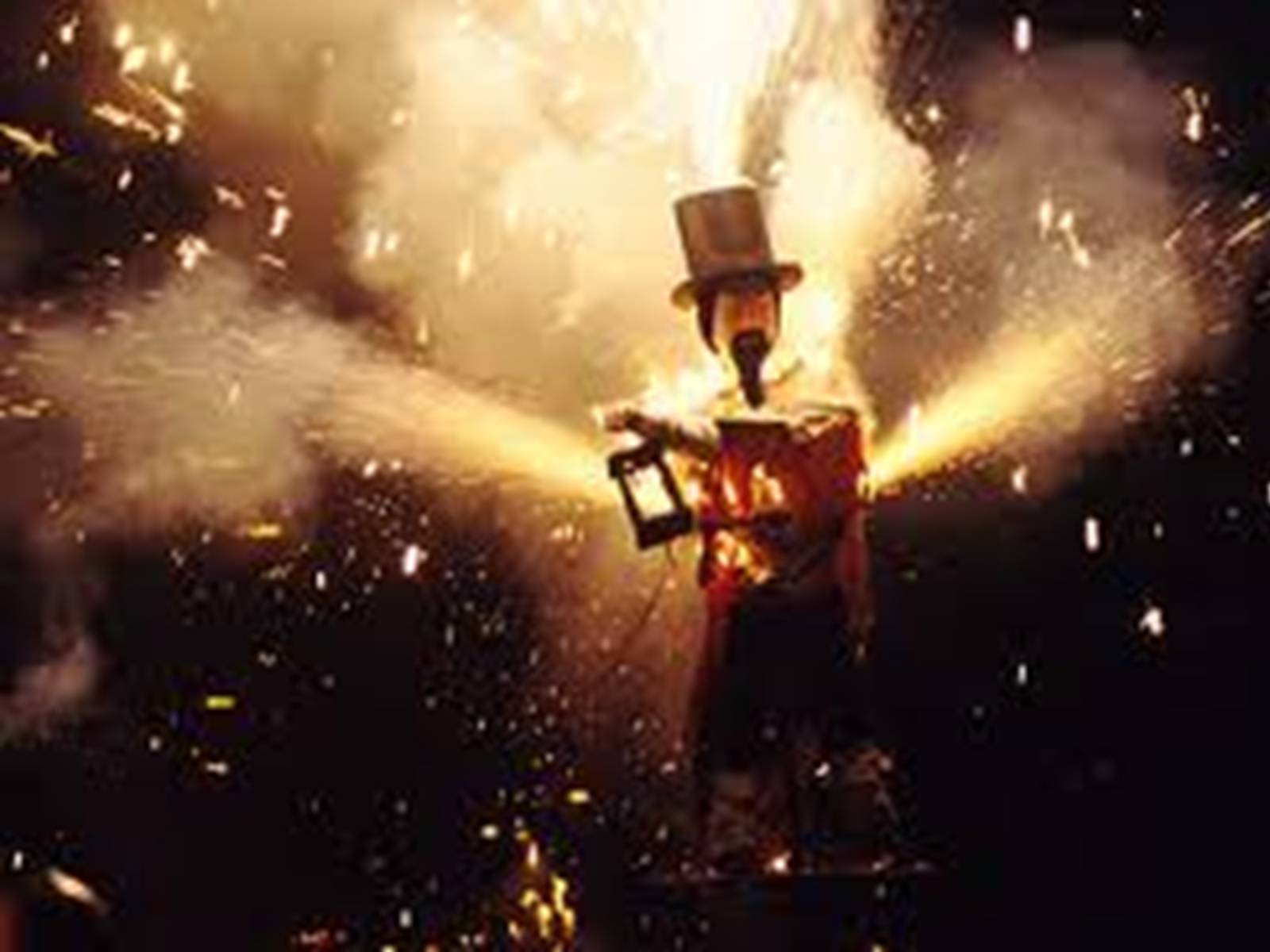
Слайд #10
An old children's rhyme runs:
Remember, remember, the fifth of November,
Gunpowder, treason and plot!
I see no reason why gunpowder treason
Should ever be forgot!
Children make a “guy” – an effigy of Guy Fawkes – and burn it on an bonfire, and let off fireworks. Because of recent concern about the dangers of bonfires and fireworks, most local communities now hold, large, organised parties, with the children being kept at a safe distance.
Remember, remember, the fifth of November,
Gunpowder, treason and plot!
I see no reason why gunpowder treason
Should ever be forgot!
Children make a “guy” – an effigy of Guy Fawkes – and burn it on an bonfire, and let off fireworks. Because of recent concern about the dangers of bonfires and fireworks, most local communities now hold, large, organised parties, with the children being kept at a safe distance.
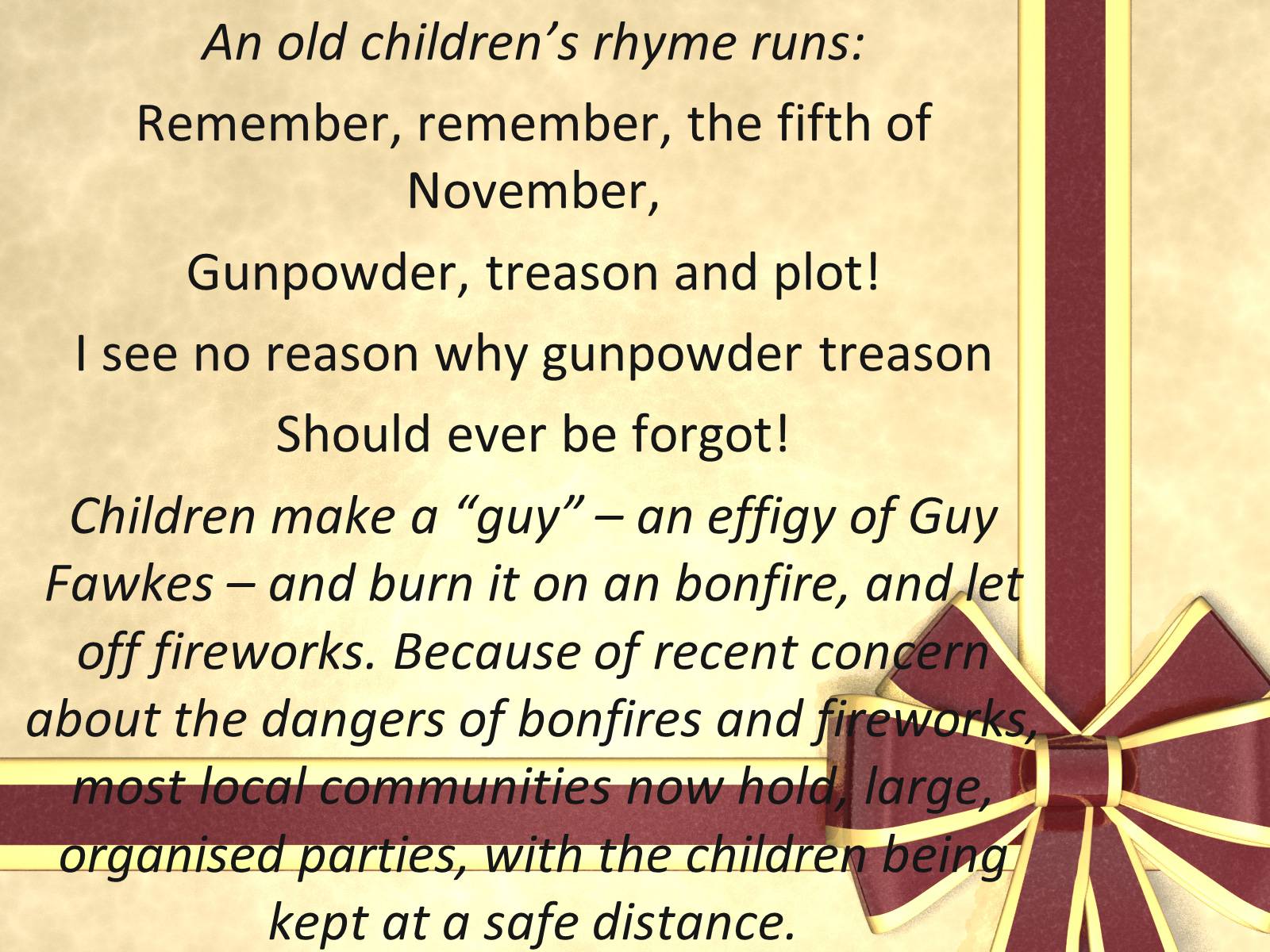
Слайд #11
An old children's rhyme runs:
Remember, remember, the fifth of November,
Gunpowder, treason and plot!
I see no reason why gunpowder treason
Should ever be forgot!
Children make a “guy” – an effigy of Guy Fawkes – and burn it on an bonfire, and let off fireworks. Because of recent concern about the dangers of bonfires and fireworks, most local communities now hold, large, organised parties, with the children being kept at a safe distance.
Remember, remember, the fifth of November,
Gunpowder, treason and plot!
I see no reason why gunpowder treason
Should ever be forgot!
Children make a “guy” – an effigy of Guy Fawkes – and burn it on an bonfire, and let off fireworks. Because of recent concern about the dangers of bonfires and fireworks, most local communities now hold, large, organised parties, with the children being kept at a safe distance.
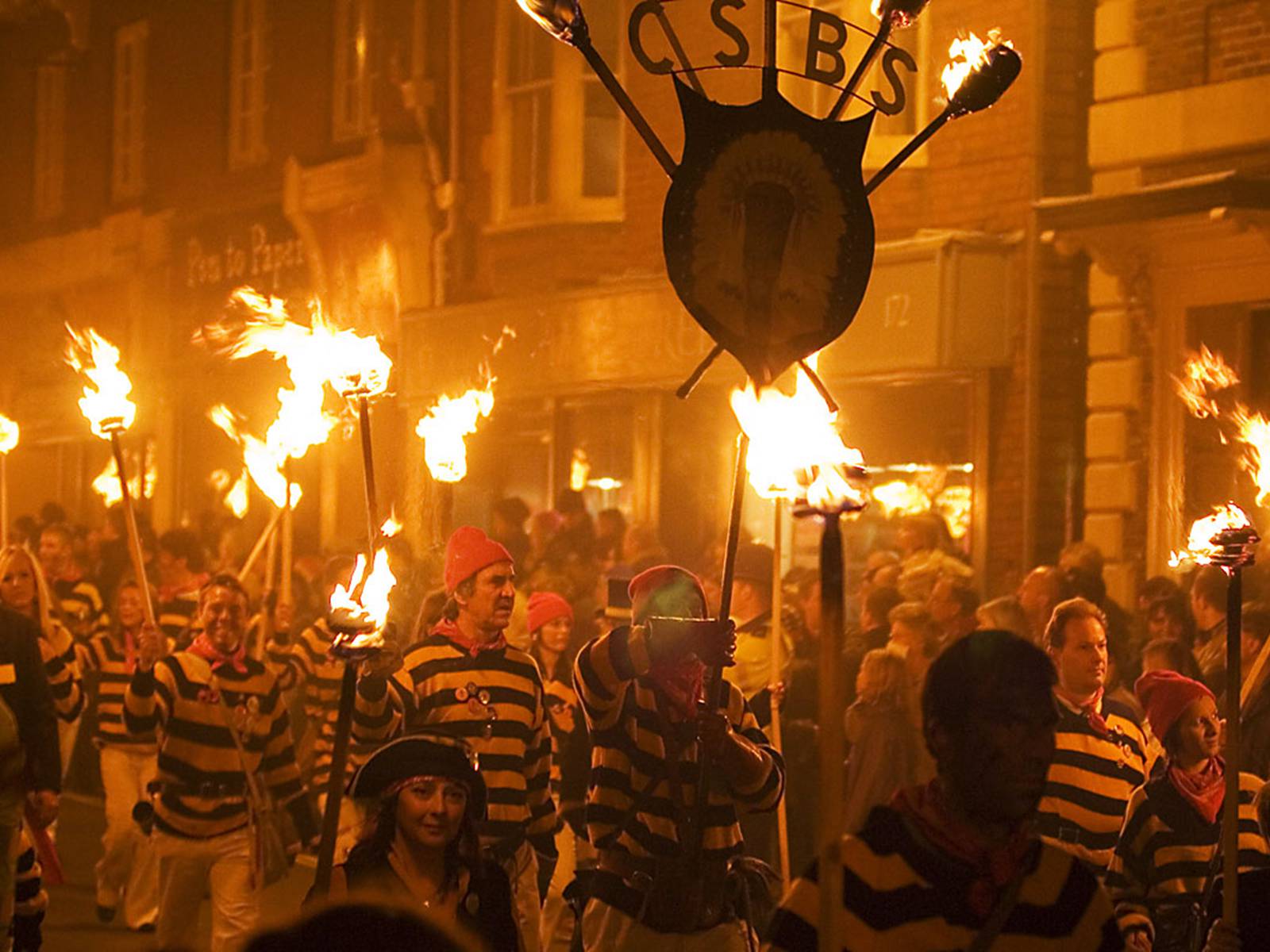
Слайд #12
Christmas
Most people in Britain see Christmas as the major festival of the year – an occasion for parties, giving and receiving gifts, eating and drinking, and generally having fun.
Most people in Britain see Christmas as the major festival of the year – an occasion for parties, giving and receiving gifts, eating and drinking, and generally having fun.
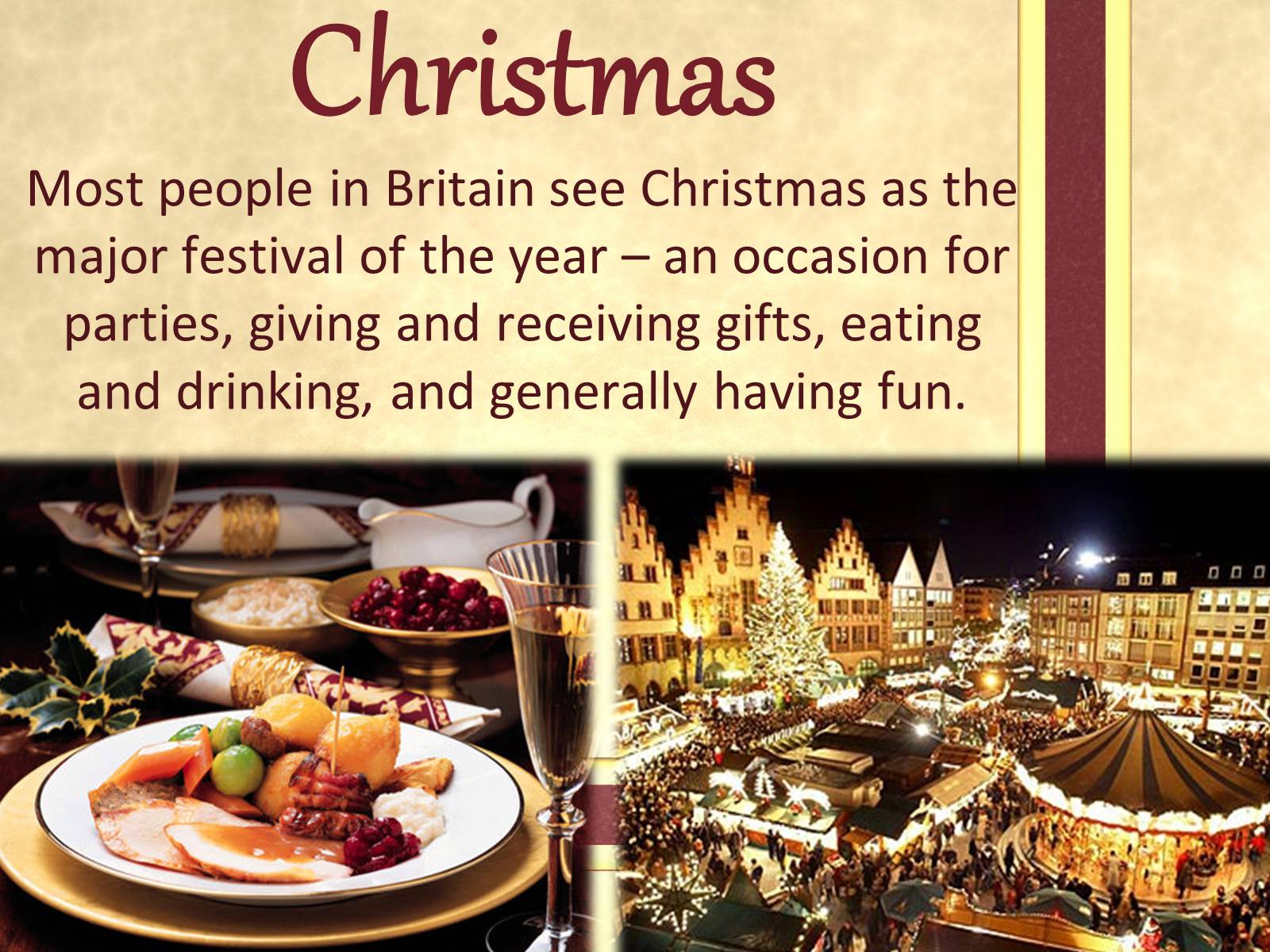
Слайд #13
The many non-religious traditions associated with Christmas are in fact not very old, dating back only to the 19th century. These are mostly for children. On Christmas Eve, children hang stockings at the end of their beds or over the fireplace. They are told that Father Christmas, or Santa Claus, arrives at night chimney and fills each stocking with presents. The children open their presents – put there secretly by their parents – on Christmas morning.
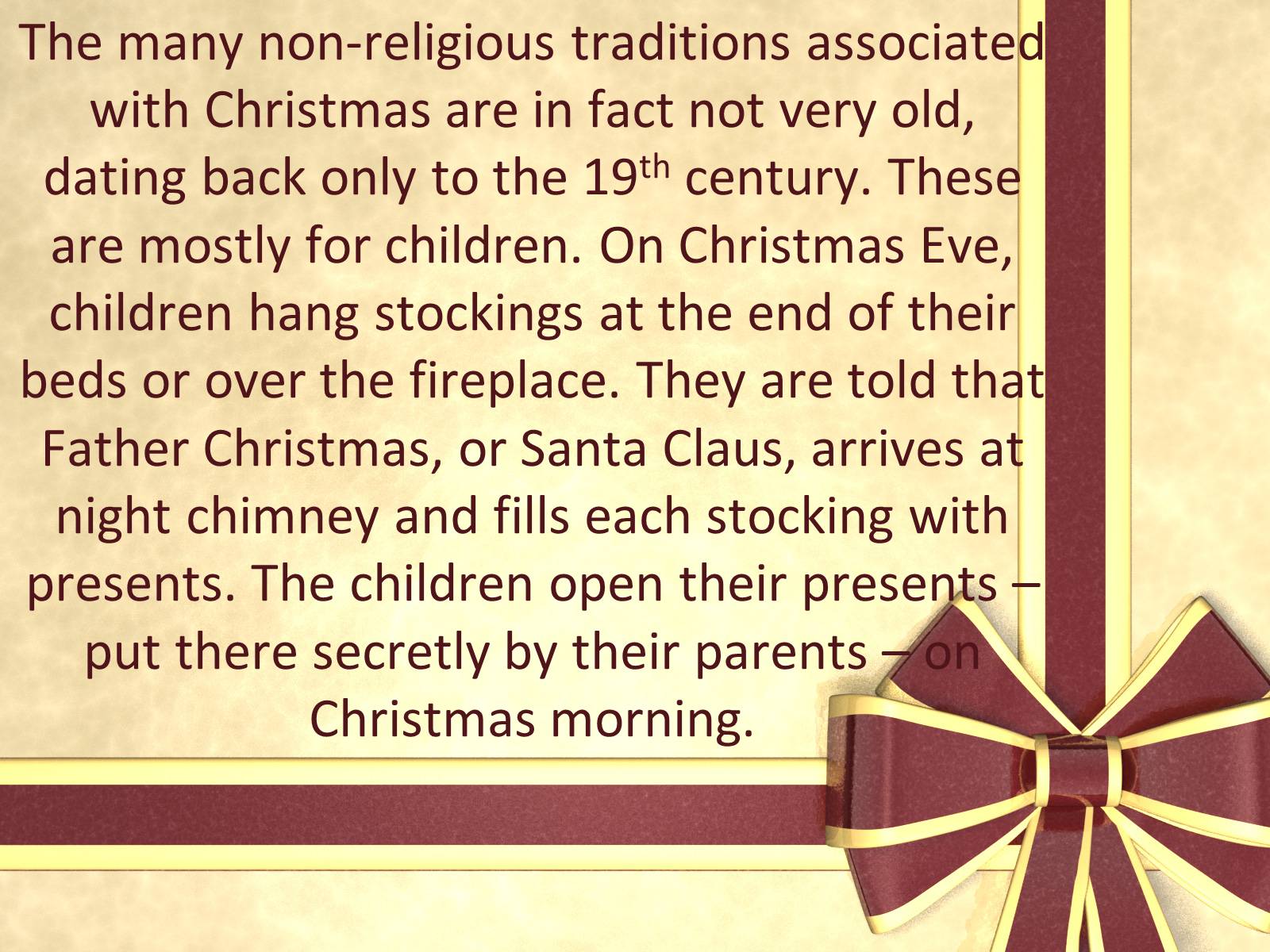
Слайд #14
The many non-religious traditions associated with Christmas are in fact not very old, dating back only to the 19th century. These are mostly for children. On Christmas Eve, children hang stockings at the end of their beds or over the fireplace. They are told that Father Christmas, or Santa Claus, arrives at night chimney and fills each stocking with presents. The children open their presents – put there secretly by their parents – on Christmas morning.
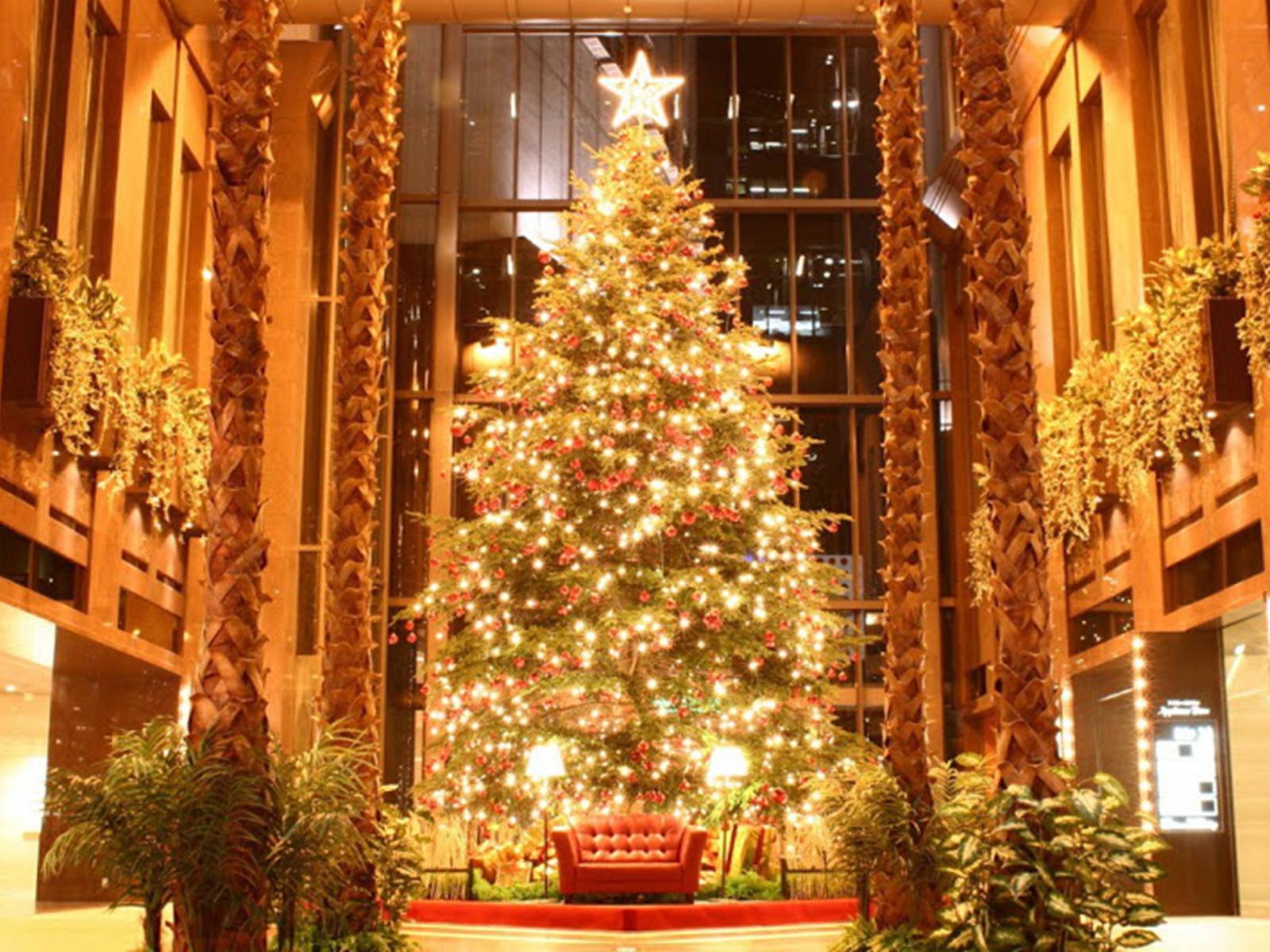
Слайд #15
Lunch is the most important point of Christmas Day. The traditional lunch consists of roast turkey with vegetables, followed by Christmas pudding, which is made with dried fruit and brandy. Sometimes a coin is put in the pudding as a surprise.
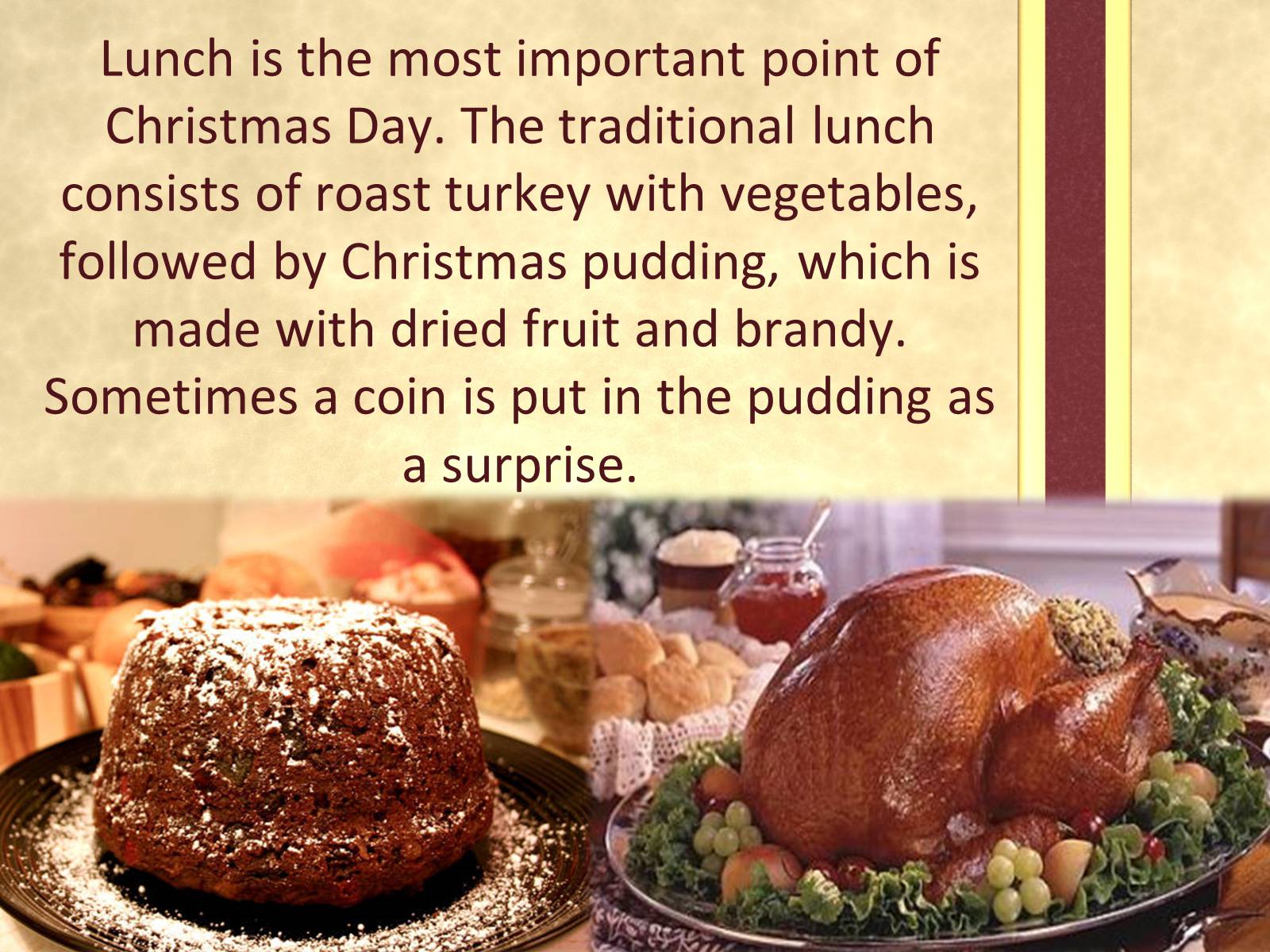
Слайд #16
The day after Christmas Day is called Boxing day (probably after the church alms box which was opened for the poor on that day) and this too is a public holiday.
Religious observance has declined in Britain, but many people still go to church at Christmas – to a midnight mass on Christmas Eve or to a morning service on Christmas Day.
Religious observance has declined in Britain, but many people still go to church at Christmas – to a midnight mass on Christmas Eve or to a morning service on Christmas Day.
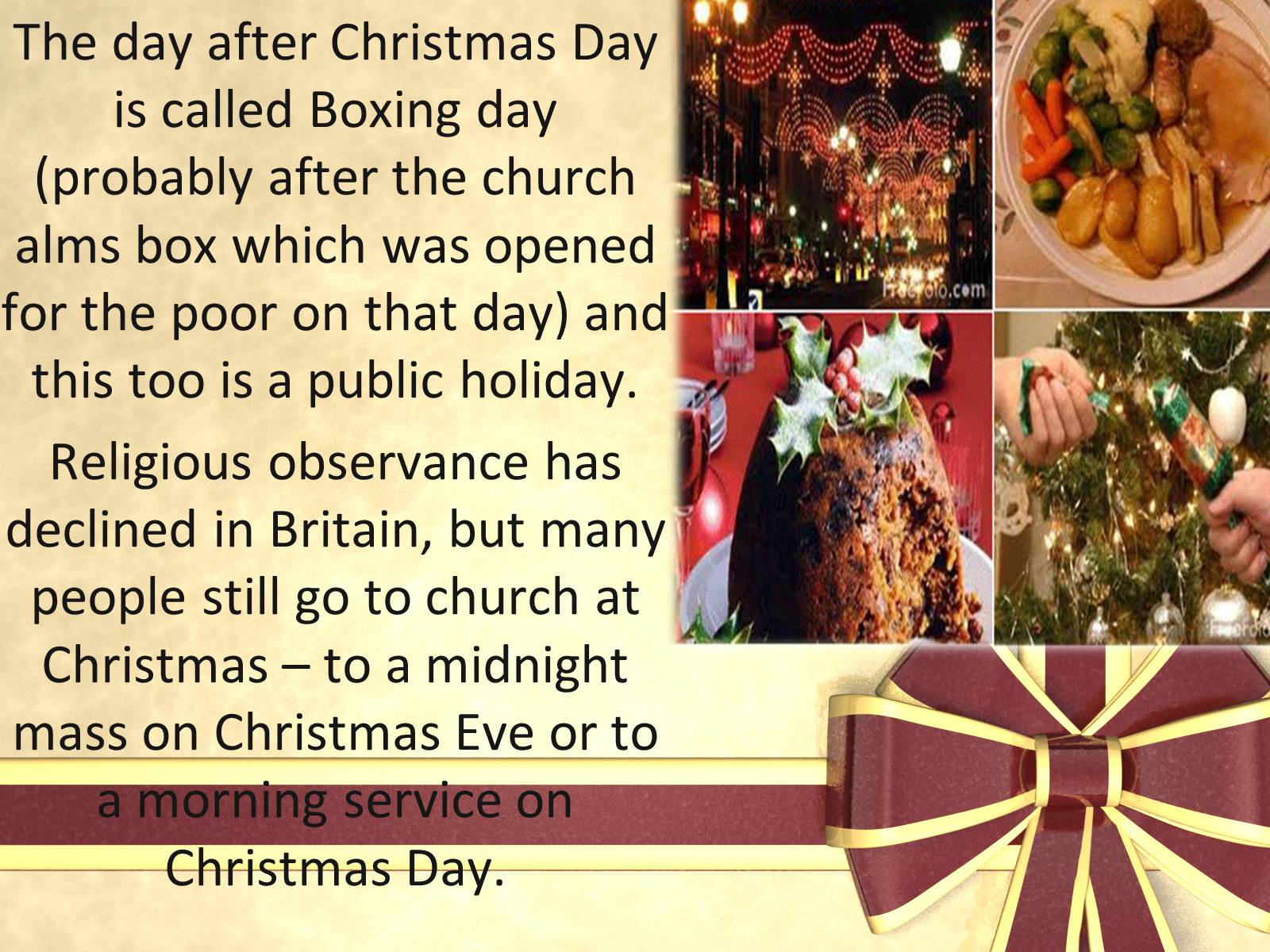
Слайд #17
New Year's Day, or Hogmanay
People all over Britain celebrate the passing of the old year and the coming of the new. In Scotland, Hogmanay – as it is called there – is a almost as important as Christmas.
People all over Britain celebrate the passing of the old year and the coming of the new. In Scotland, Hogmanay – as it is called there – is a almost as important as Christmas.
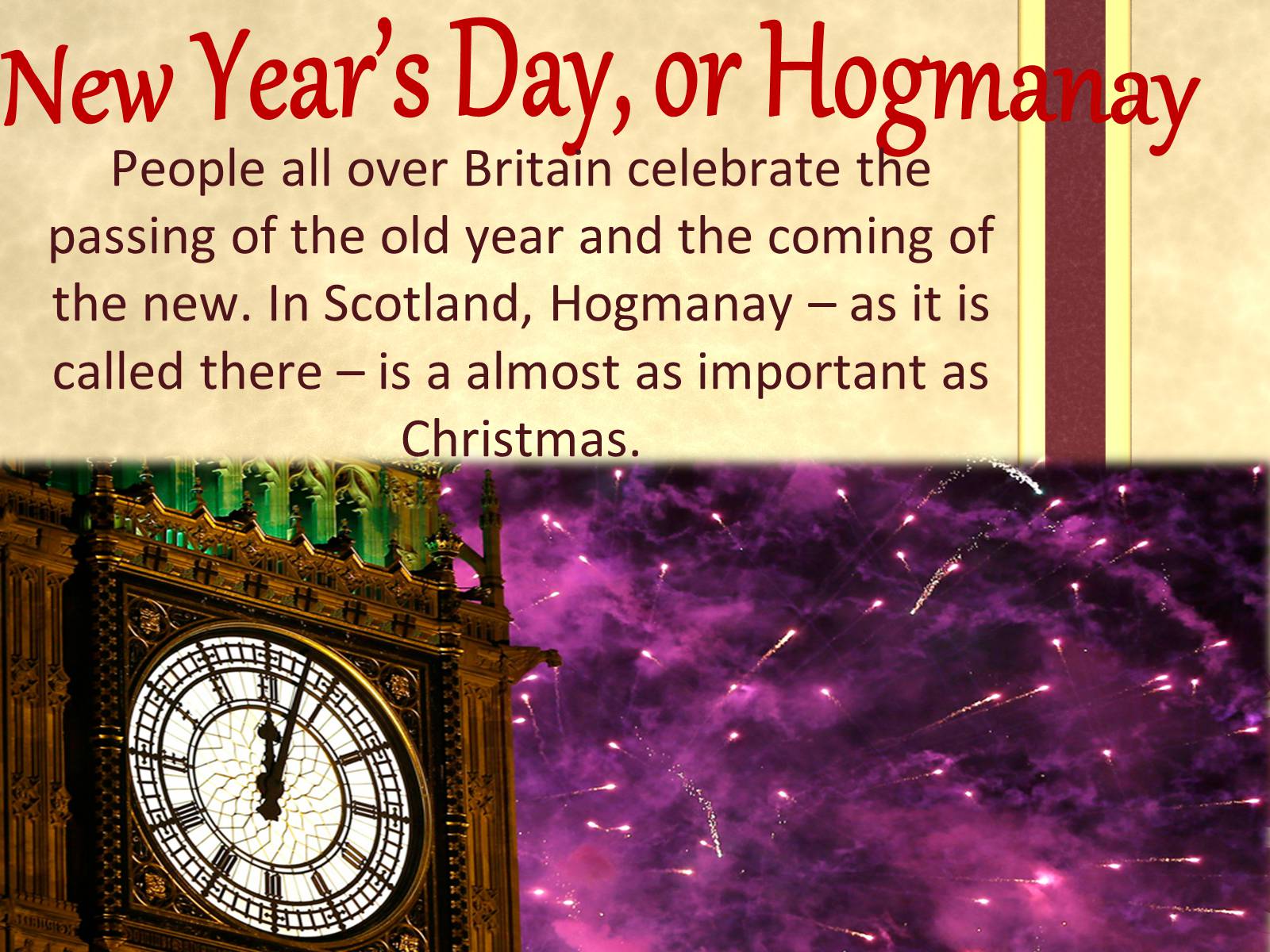
Слайд #18
The Scots take New Year's Eve very seriously, and anyone unwise enough to try to sleep at midnight is likely to be woken up by a band of “first footers”. First footers go from house to house after midnight carrying lumps of coal (seen as symbols of good luck) and they expect a glass of whisky in each house they visit!
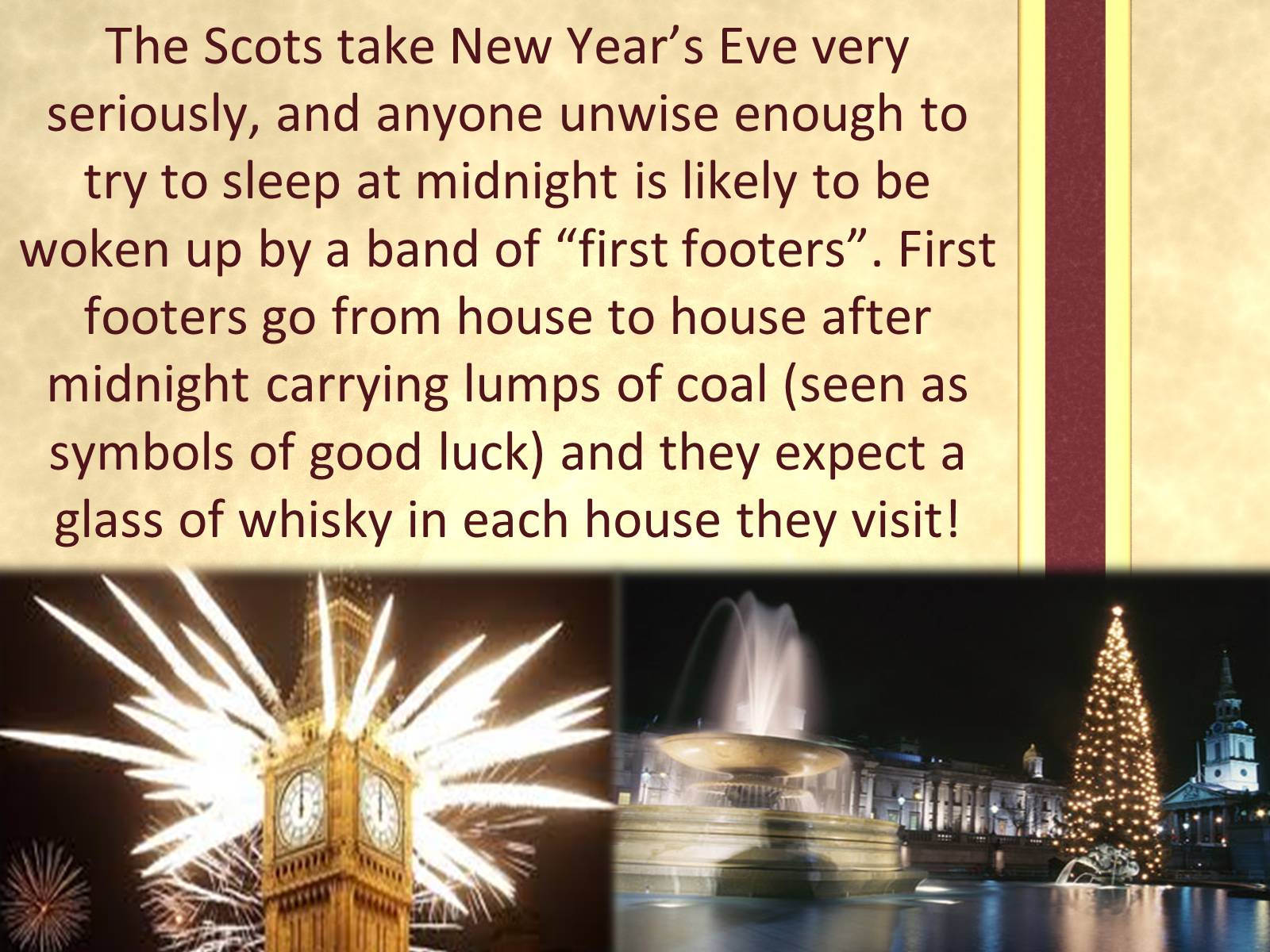
Слайд #19
Thank you for your attention!

Слайд #20
Ask:
What happens to people who don't give children a “treat” on 31 October?
What is sometimes the surprise in a Christmas pudding?
What is another name for Father Christmas?
What happens to people who don't give children a “treat” on 31 October?
What is sometimes the surprise in a Christmas pudding?
What is another name for Father Christmas?
